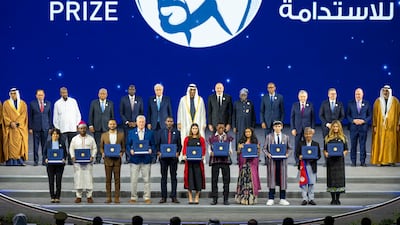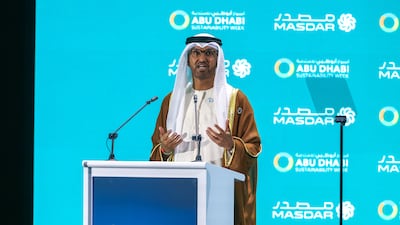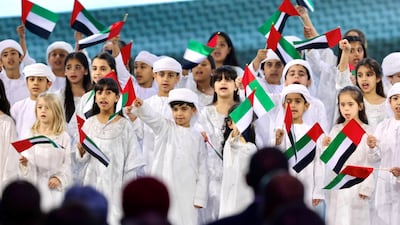An electric vehicle manufacturer based in Bangladesh was among the winners announced at the Zayed Sustainability Prize ceremony in Abu Dhabi on Tuesday.
President Sheikh Mohamed and several high-level guests attended the event at Abu Dhabi National Exhibition Centre (Adnec) to recognise 11 pioneering organisations and high schools from around the world.
Sheikh Mohamed said the UAE remains steadfast in its commitment to fostering sustainable development and empowering communities around the world through innovation.
Palki Motors took home the prize for energy, three years after electrical engineer Mustafa Al Momin launched the company. He told The National that he started with just $4,000 in his pocket to buy spare parts and, with prize money of US$1 million in the bank, the company will now be able to scale up production from 10 vehicles a month to 100 vehicles.
Mr Al Momin was inspired to build electric cars to combat Dhaka's pollution and improve the livelihoods of commercial drivers. He designed the first prototype in his uncle’s garage.
“This recognition motivates us to push even harder,” he said. “We believe in the power of technology and innovation to uplift entire communities, and this victory will give us the confidence to expand globally, bringing hope and opportunity to drivers everywhere.”
Palki Motors has helped commercial drivers and companies save up to 90 per cent on fuel costs and 50 per cent on maintenance expenses in Bangladesh. The company's cars incorporate features such as battery-swapping, which enables drivers to trade drained batteries for fully charged ones in just two minutes.
The company has benefitted 23,000 people to date and aims to reduce 260,000 tonnes of carbon dioxide emissions annually by 2027, through the sale of 20,000 electric cars and 20,000 electric lorries.
What is the Zayed Sustainability Prize?
The prize aims to spotlight solutions addressing the climate crisis. This year's fund was Dh21 million ($5.9 million) in total, an increase of Dh13 million from last year.
The prize awarded Dh3.6 million (US$1 million) to each winner in the categories of health, food, energy, water and climate action.
Within the global high schools category, which is divided into six regions, each school could claim up to Dh550,000 (US$150,000) to start or expand their project. The regions were the Americas, Europe and Central Asia, the Middle East and North Africa, Sub-Saharan Africa, South Asia, and East Asia and Pacific.
The winners
India’s Periwinkle Technologies won the health category for its portable, AI-enabled cervical cancer screening device. It operates without electricity and provides results at the point of care within 30 seconds.
In the food category, Nigeria’s NaFarm Foods won for its hybrid solar food dryers that prevent post-harvest losses.
Australia's SkyJuice Foundation picked up the award in the water category for its gravity-powered water treatment system, which uses low-pressure membrane filters to provide clean drinking water without the need for chemicals, pumps or external energy sources.
In the climate action category, OpenMap Development Tanzania won for its innovative mapping, which merges community-driven data collection with advanced technology such as drones, geographic information systems and remote sensing.

School effort
Monica Akkineni and Muskan Maheshwari, both 15, spent the summer developing sponge bricks made from green algae to improve air quality in classrooms and other settings. Their efforts were recognised when Merryland International School in Abu Dhabi was among winners in the global high schools category.
Their innovation aims to benefit around 3,000 students and staff at the school, creating better air quality, improved health and increased productivity. The school aims to inspire wider adoption of sustainable practices, fostering environmental awareness in the local community.
Ms Akkineni and Ms Maheshwari, both Indian nationals who live in Abu Dhabi, developed the bricks using coconut husks and industrial cement. A wall of 20 algae bricks is now on show at their school.
“It took us around four or five months to get the final working prototype,” Ms Akkineni told The National as she beamed with pride after receiving the award from Sheikh Mohamed. The pair hope the $150,000 prize money can be used by the school to expand their project.
The other winners in this category were Mexico's Centro de Estudios Tecnologicos del Mar07, representing the Americas, Ghana's Sakafia Islamic Senior High School, representing sub-Saharan Africa, Uzbekistan's Presidential School in Tashkent, representing Europe and Central Asia, Nepal's Janamaitri Multiple Campus, representing South Asia, and New Zealand's Te Pa o Rakaihautu, representing East Asia and the Pacific.
“Today, we recognise a remarkable group of organisations and high schools that are driving tangible progress toward a more prosperous future,” said Dr Sultan Al Jaber, Minister of Industry and Advanced Technology and director general of the Zayed Sustainability Prize. “This year’s prize winners showcase solutions that leverage advanced technologies including AI, enhance local resilience and deliver transformative, scalable impact worldwide. In doing so, they embody the power of progress in accelerating sustainable development and inclusive socioeconomic growth.”
























